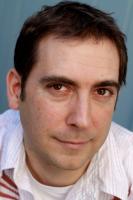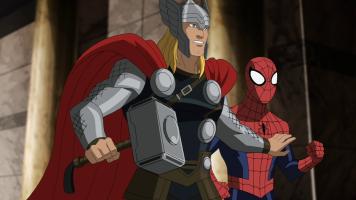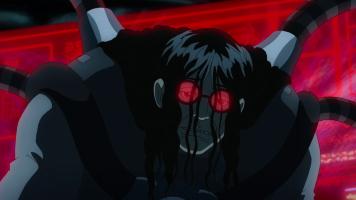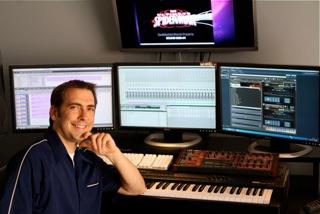
CHARACTERS · EPISODES · GUIDES · MEDIA · RELEASES · BACKSTAGE · FORUM Marvel Animation Age catches up with composer Kevin Manthei, well-known among animation and video game aficionados for his work on such titles including Ultimate Spider-Man (the classic video game), Justice League: The New Frontier, Batman: Gotham Knight, Generator Rex, among others. Now, Manthei sits down with Marvel Animation age to discuss this latest project - the new Disney XD animated series Ultimate Spider-Man.
Kevin Manthei: I have been composing for film, television and games for nearly 20 years. I have composed over 60 game titles, six or so animated series, as well as worked on some big feature films doing additional music and have scored some independent films. I have been nominated twice for an Annie Award. The first time was for my work on Invader Zim and the second was for Batman: Gotham Knight. Some other past projects from recent years are Justice League: The New Frontier (Warner Brothers animated feature), Generator Rex (Cartoon Network), TRON: Evolution (Disney game), Star Trek Online & Champions Online (Cyptic Studios Online games). MAA: To cut to the chase, how did you become a part of the Ultimate Spider-Man animated program? KM: Eric Radomski and I had worked together on Xioalin Showdown for Warner Brothers. I scored that show and we have stayed in touch since then. He brought me in early and had me compose some music to their proof of concept trailer that they ultimately played at Comic-Con. For the trailer he wanted to see how I could capture the energy of Spider-Man through a high-energy punk rock infused score. I experimented with it being just punk rock as well as having a punk rock edge but with more of an orchestral score. Eric likened the music to having the feel of motocross sports – I actually watched some motocross YouTube videos just to get a sense of the motion and excitement. We went back and forth a few times with the music and then ultimately he shared it with the rest of the team and they all liked the direction and decided to go with me to score the show. MAA: What is your approach to the series? Given how an episode can go from action to comedy to drama and back to action in literally seconds, given its frantic pace, how exactly do you score an episode that’s so...all over the place? KM: Each show has its own identity but within that you’re right that there are some commonalities. This show is not one to stay within a particular stream of thought for too long. It keeps me on my toes with its stopping-on-a-dime during an action sequence to play a short cut-away comedy piece. I enjoy these challenges and run with it. I am a film composer – the very definition is that I score music to picture – so yes it’s challenging but that is my job to make the music work and feel right no matter how quickly and wildly the picture changes. Sometimes the job of the music is to get out of the way – we play all most of the 'fourth wall' moments where Peter talks to the camera without any music. We found it plays better that way. My overall approach to the score for Spider-Man is a hybrid score – that is a score that is orchestral in nature but is always combining itself with modern percussion, punk and rock grooves, electronica, weird sound designy music, etc. I always want the music to sound fresh and keep the action moving. I have really enjoyed creating some big character themes and writing some epic cues for some epic Marvel characters. MAA: The show does not contain opening credits, merely a title screen. Did you compose a theme for the opening credits? How did you choose the brief piece of music to use for the title screen?
MAA: Some readers may not know this, but you provided the score to the Ultimate Spider-Man video game from a few years back. Will we ever catch maybe a subtle reference to it here on the animated Ultimate Spider-Man? KM: Probably not. That was 2006 and my writing style has most likely changed a bit. We were going for a much darker more intense industrial led electronica score on the game. The current Spidey is a bit more orchestral, has more humor and relies on live guitar and bass. That said I am sure if you sat and listened to the two scores you will hear some ‘Kevin Manthei’ in there. I cannot not be me! MAA: Production on the second season is already underway. Will you be returning to provide the score to the next batch of episodes? And, if so, how do you hope to expand on your score work from the first season? KM: Yes, I am coming back and am excited to work on the second season. I will continue to score the show in terms of flow, nuance and humor how I am doing it now. I have been told to expect some great new villains and Marvel characters so I will develop new themes for of them as well as bigger and badder villain action pieces. I am also planning to continue to evolve my existing themes for Spider-Man, Fury, the group and existing villains. MAA: Can you walk us through the process of scoring an episode? How do you choose the specific cues, the type of music (upbeat, somber, fast, etc.), and what inspirations do you draw from? Do the characters we see on screen influence what type of score we’ll hear? KM: I've had this notion before that the music is already written – I just need to sit in front of my music keyboard and computer and write it. Of course it’s not that easy but the process is this: I watch the episode with the producers, which we call the spotting session. I take notes, I ask questions, they answer, they also provide insight on certain areas of the episode that they have ideas on. The spotting session is super important at the beginning of a series. Once we spot five or so episodes we then just chat on the phone to get some big idea type notes. I then go home and get to work in my studio scoring the show. I start right at the beginning and work my way through the entire episode in 3-4 days. I tend to write fast – I try to get through seven minutes of the show each day. Not all seven minutes require music but I use that as a benchmark for the day. It’s always hard to talk about the creative aspect of writing music – I don’t really know how I do it or how to do it – I would have to show you. But it’s fairly obvious too – for example: if it’s a Thor episode I know it has to have more of a fantasy epic feel. If they are running around fighting, then the music has to be high on action and support that. It’s really my job to support what is happening on screen and to support the story. The characters on screen very much influence the music – this is the art of film scoring: taking the film or television project and using that as the inspiration to write the music. Its never the other way around. I am hired to service the project and to write music that will fit like a glove and will work so well that the audience doesn’t even notice it because it helps to suck them into the show and transport them to another world! MAA: Do you have any favorite character themes, or perhaps pieces of work from the series so far? KM: Nick Fury’s theme is based on a heavy 70’s funk feel with modern electronic pulses. I really like his theme – it feels heavy, cool and tough. I think Spider-Man’s theme is catchy and simple enough to use throughout the show – if you haven’t heard it or don’t think you have, it’s the end credits piece on Ultimate Spider-Man. I have heard Marvel executives humming it at the mix so I know it must be catchy! I also like my group theme – that is the theme for the band of young superheroes that work with Spider-Man and Nick Fury. I choose to go with a theme for the bunch of them versus having specific themes for each one. It would be pretty silly during a battle sequence to be scoring it thematically when there are literally 5-7 characters all fighting at the same time. I expand on Doc Ock’s theme later in the season – I like how that one sounds. Also Norman and Harry Osborn share a theme – I felt like the angst Harry feels for his father is somehow similar to the darkness the Norman Osborn has. The theme works for Norman all on his own and plays on top of Doc Ock’s ambient creepy music very well. It also works great when Norman and Harry are talking or verbally fighting. Check out my site for many of these musical themes. MAA: You previously mentioned to me that what we hear during an episode isn’t usually what you came up with. Can you maybe provide an example of that and tell us what was changed?
I have been fortunate to get very little notes from the producers on Ultimate Spider-Man. Part of it is that we are all seeing eye to eye concerning music and I think the other part is that my music gives them lots of flexibility at the mix. So they are able to make it work! A great example of this was from the epispde "Great Responsibility." There was a cut-away gag of Spidey running away from a missile done in a very cartoony way. I pitched scoring it with punk guitars meets orchestra but in a Looney Tunes way – basically combining Looney Tunes with punk rock. They bought the idea but at the mix they fell ln love with the orchestral only version. Because I had stems for them to work off they were free to make that call there. I was happy with it too – it worked both ways! MAA: Is it safe to assume we’ll be hearing more of your work in season two? Care to tell us what else you may have coming down the pipeline?— KM: I will be scoring the second season of Ultimate Spider-Man later this year. Stuff coming down the pipeline? Well, I am currently beginning work on Neverwinter – a massive multiplayer online game for Cryptic Studios as well as working on a yet to be announced game title. I am also working on another un-announced animated pilot that hopefully will jump into production! Wish I could say more but I hope you all can take a moment to stop by my website and check out some music and drop me a line. Thanks for reading!
Marvel Animation Age would like to thank Kevin Manthei for his participation in this Q & A!
Kevin Manthei Music
Find Kevin Manthei on Ultimate Spider-Man, Ultimate Spider-Man: Web Warriors, Ultimate Spider-Man VS. The Sinister Six and related characters and indicia are property of Marvel Entertainment, LLC, a wholly-owned subsidiary of The Walt Disney Company, 2001 - 2015. Marvel Animation Age and everything relating to this site - copyright, 2015. Proudly hosted by toonzone. Contact us. |



